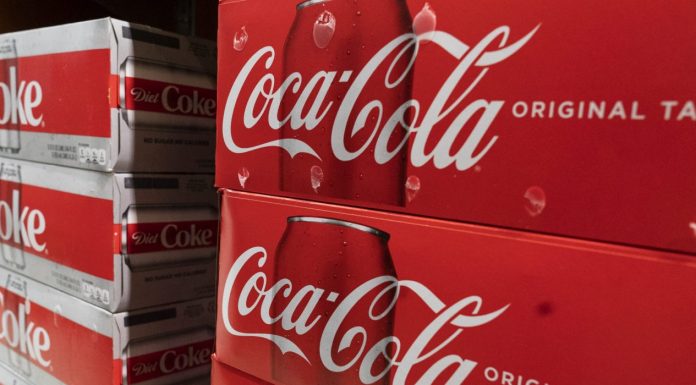The self-sustaining eco-system of woke activism revealed itself during Coca-Cola‘s recent first-quarter financial reports as the company tapped growing Chinese markets to stem its US losses.
The Atlanta-based beverage company is facing nationwide boycotts from conservatives after its leftist CEO James Quincey offensively stepped into a political debate over election integrity in Georgia.
“We want to be crystal clear and state unambiguously that we are disappointed in the outcome of the Georgia voting legislation,” Quincey said in a statement after facing pressure from left-wing activists in the state to weigh in.
The alarming level of virtue-signaling has confounded many, given the once cozy relationship that Republicans maintained with big business.
But the missing piece of the puzzle now seems to be China, which is allowing globalist companies to expand their market there even as coronavirus restrictions and other left-driven crises lead US markets to contract.
China maintains a symbiotic relationship with radical leftist politicians, including President Joe Biden and his family, by providing them dark-money campaign funds and other resources in return for policies that are more favorable to China—and often less so to America.
In return, businesses that engage in activist virtue signaling that helps buoy the harmful progressive agenda are able to buoy themselves in the Asian market, earning favorable arrangements under China’s system of social credits.
Stateside, Coke has been the subject of negative headlines since coming out against Georgia’s election-integrity bill.
Calls from conservative leaders, including former president Donald Trump, to boycott the company may have led to its decision to take a more conciliatory approach by declining to sign a New York Times advertorial.
““We believe the best way to make progress now is for everyone to come together to listen, respectfully share concerns and collaborate on a path forward,” the company said in a statement, according to the Washington Examiner.
“We remain open to productive conversations with advocacy groups and lawmakers who may have differing views,” it continued. “It’s time to find common ground. In the end, we all want the same thing—free and fair elections, the cornerstone of our democracy.”
For many conservatives, that was likely to be too little, too late. It comes on the heels of another controversy in which the company forced employees to undergo a training seminar that encouraged them to “try to be less white.”
On social media, some suggested that the appropriate time to end the boycott of companies like Coke and Delta Airlines would be when the CEOs who supported the politically divisive statements step down.
But whether the company will feel the pinch remains to be seen.
In announcing its recent earnings projections, there was nary a word about the possibility of a sustained boycott leaving a mark in its second-quarter earnings.
Instead, it claimed that a rapid return to pre-coronavirus normalcy in restaurants, stadiums and public places could offer a major revenue jolt.
As of March, production had returned to 2019 levels, the beverage giant said. First-quarter volume growth was particularly strong in China, which was locked down last year.
Quincey said the company remains on track to deliver 2021 earnings that match or exceed 2019. But he cautioned that sales could still slip backward due to … another COVID relapse from socially irresponsible deplorables.
Global coronavirus cases recently hit a new peak, he said, and that could cause some markets to shut down again.
“The principal uncertainty remains the risk of additional lockdowns,” Quincey said during a conference call with analysts Monday. “There’s no guarantee there won’t be some extra degree of lockdowns in May or October or December that puts pressure back on the business.”
Sales rose 5% in the January-March period this year, the Atlanta company said Monday. But the recovery is uneven. Case volume fell 6% North America and 2% in Europe and Africa. Case volume was flat in Latin America and jumped 9% in Asia.
The quarterly earnings did not reflect Coke’s entry into the political scrum. Quincey’s initial statement about the Georgia law came on April 1—the first day of the second quarter, although it was no April Fools’ joke.
Net income dropped 19% to $2.2 billion in the first quarter.
Investor response was muted partly because the company could soon face a big tax bill. Late last year, a U.S. tax court ruled in favor of the U.S. Internal Revenue Service in a 6-year-old case that could force Coke to pay up to $12 billion in back taxes.
Coke is appealing the ruling. Chief Financial Officer John Murphy said Monday that the company didn’t have any update on when the case might be resolved.
The company also announced Monday a public listing for Coca-Cola Beverages Africa, a Johannesburg, South Africa-based bottler. Coke, which holds a majority stake in the company, said it will sell some of its holdings as part of the IPO, which is set to occur sometime in the next 18 months.
The bottler employs 16,000 people and accounts for 40% of Coke’s sales volume in Africa.
“We believe in the future of Africa as a continent, as an economy, and we think we’ve got a great, capable bottler that can help lead our ability to grow there,” Quincey said.
The Associated Press contributed to this report.

